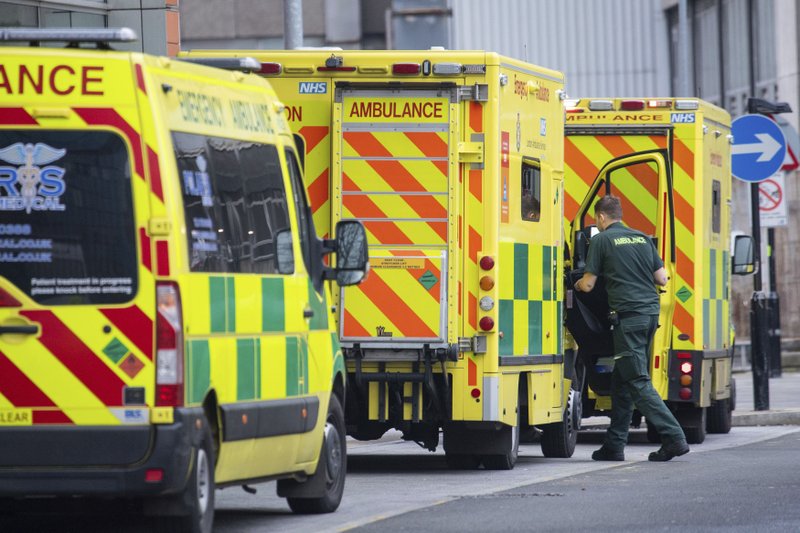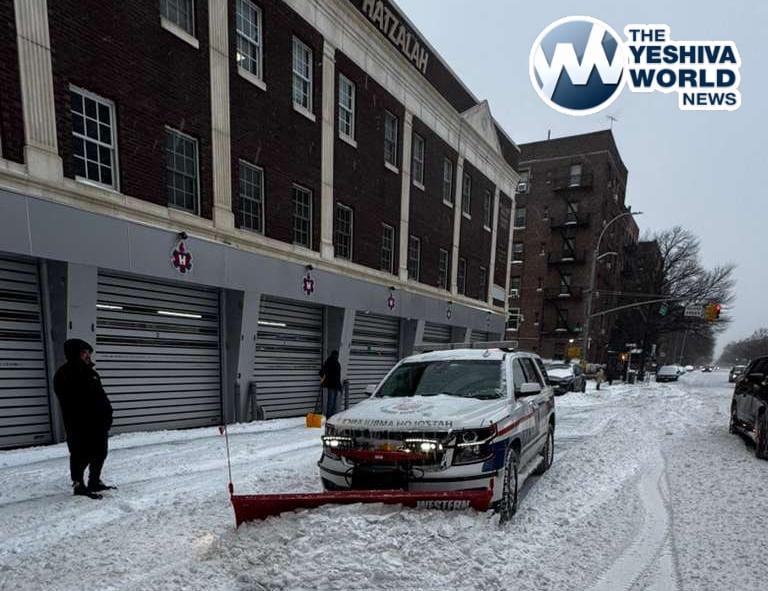England’s National Health Service is accustomed to tough winters — and caring for people on overcrowded wards sometimes means moving patients into the corridor. But this is different. Now some are lucky just to get medical help as they wait in an ambulance in the parking lot.
Pressure on the nation’s hospitals forced the hand of Prime Minister Boris Johnson, who has plunged the country into its third national lockdown and ordered everyone to stay at home as much as possible for at least the next six weeks. The situation is worsening, said Siva Anandaciva, chief analyst of the King’s Fund think tank.
“It’s not hyperbole to say that the (National Health Service) is going through probably the toughest time in living memory,″ he told The Associated Press. Anandaciva said some emergency rooms have waits of 12 hours.
“I was speaking to an emergency care physician from London last week, and she was saying that half of her shift was spent delivering care in ambulances because they couldn’t get the patients into the emergency department,″ he said. “So you put that all together and you paint a picture of the health service that’s under incredible pressure.”
Johnson announced the tough new stay-at-home order for England that takes effect at midnight Tuesday and won’t be reviewed until at least mid-February. Few in England expect any relief until after the traditional late February school break.
“The weeks ahead will be the hardest yet, but I really do believe that we are entering the last phase of the struggle,” Johnson told the nation Monday night. “Because with every jab that goes into our arms, we are tilting the odds against COVID and in favor of the British people.”
Scotland’s leader, Nicola Sturgeon, also imposed a lockdown that began Tuesday. Northern Ireland and Wales had already imposed tough measures, though rules vary.
Johnson and Sturgeon said the restrictions were needed to protect the hard-pressed National Health Service as a new, more contagious variant of coronavirus sweeps across Britain. On Monday, hospitals in England were treating 26,626 COVID-19 patients, 40% more than during the first peak in mid-April.
Many U.K. hospitals have already been forced to cancel elective surgeries and the strain of responding to the pandemic may soon delay cancer surgery and limit intensive care services for patients without COVID-19. Intensive care units are full and spilling over.
Public health officials hope the new lockdown will reduce the strains on the NHS while they roll out a national vaccination program that targets older people, health care workers and those particularly vulnerable to COVID-19. Britain has approved vaccine shots from two different manufacturers so far — one from Pfizer-BioNTech and the other from Oxford University and AstraZeneca.
The government hopes to give a first dose of vaccine to everyone in its top four priority groups, or 13 million people, by the middle of February, Johnson said.
While the rollout is complicated, Anandaciva said the structure of the NHS will help it deliver the vaccinations. Besides hospitals, doctors and nurses, it can rely on other allied health care professionals, such as pharmacists, to give vaccine shots.
“That’s one area where you can really maximize the benefits of having a nationalized service because you can … establish hubs, you can pool staff, and you’ve got a very strong brand to attract people,″ he said. “I think the NHS is doing quite a good job of setting up the logistics of how you will get the vaccine into the right places.”
In the meantime, grants are being given to help businesses further strained by the new rules. Grants of up to 9,000 pounds ($12,200) will be offered to businesses in the retail, hospitality and leisure sectors.
“The new strain of the virus presents us all with a huge challenge – and, whilst the vaccine is being rolled out, we have needed to tighten restrictions further,″ Treasury chief Rishi Sunak said. “Throughout the pandemic we’ve taken swift action to protect lives and livelihoods and today we’re announcing a further cash injection to support businesses and jobs until the spring.″
Johnson announced the lockdown after the chief medical officers of England, Northern Ireland, Scotland and Wales raised the U.K.-wide COVID-19 threat assessment to the highest level. The health system is already under “immense pressure,” they said.
The new measures are similar to those imposed last spring, with people being told to work from home unless it’s impossible to do so, and to leave home only for exercise or essential trips such as grocery shopping. Schools across England were ordered to close their doors except for the children of critical workers and most vulnerable children, and shift to online instruction beginning Tuesday. University students won’t return to campus until at least mid-February.
All nonessential shops and personal care services like hairdressers will stay closed. Restaurants will be allowed to offer takeout services only.
New COVID-19 infections have soared in recent weeks as public health officials struggled to contain the new variant, which the government says is 50% to 70% more contagious. The number of confirmed new daily infections in the past seven days jumped 50% from the previous week, and coronavirus-related deaths rose 21% in the same period.
Britain has been seeing over 50,000 new infections a day for a week and has reported 75,500 virus-related deaths overall, one of the highest tallies in Europe.
(AP)












2 Responses
There are numerous extra rooms at Buckingham Palace, where they could set up temporary beds & wards for the less seriously ill.
Sorry fake news. I live in UK I was in hospital this week not for covid the hospital was as calm as ever. They quote one hospital and make that reality.